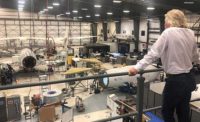Making it in America—Companies Reshore Manufacturing of Essential Products
Shortages of essential products caused or revealed by the COVID-19 pandemic warrant shortening supply chains to reduce risk and increase resilience.




Shortening and closing supply chain gaps for essential products will immediately benefit the following industries: personal protective equipment (PPE), medical device manufacturing, electronics and defense. Sixty percent of reshoring cases after March 2020 mention the pandemic as a factor in the decisions. Already, reshoring cases among manufacturers of medical devices and PPE are double compared with last year.
Here are some examples of the reshoring shift of essential products.
Historically, Boston-based Shawmut Corp. manufactured high-performance advanced materials for automotive, medical, industrial and military applications. But the COVID-induced shortage of critical PPE prompted fourth-generation family-run business to create a new Health and Safety unit to produce medical isolation gowns, surgical barrier fabrics and N95 respirators. A facility expansion that included 50 new assembly lines would create 300 new jobs upon completion.
“We’re making a significant, long-term commitment to developing innovative U.S.-made health and safety products not only for this period of great need, but well beyond so that our country never faces a critical PPE shortage again,” says CEO James Wyner.
Based in Long Beach, CA, design firm Nectar Product Development and its affiliated medical device company, BreathDirect, received Emergency Use Authorization from the U.S. Food and Drug Administration (FDA) in March 2021 for its BDR-19 critical care ventilator. FDA Emergency Use Authorization was vital since almost half of stockpiled ventilators didn’t meet the minimum requirements needed to treat critically ill COVID-19 patients.
“All components of the BDR-19 are sourced in the U.S., resulting in a secure and stable supply chain,” says BreathDirect founder and CEO Darren Saravis. “Our manufacturing partners at Evolve Manufacturing in Fremont, CA, have designed and readied their assembly lines so that we can have ventilators ready to ship to medical facilities within weeks.”
The aerospace and defense industries, which require mission-critical components for high-stakes applications, are focused on transforming their supply chains to mitigate disruptions. A recent study by Deloitte shows these industries will likely shift toward strategies like reshoring to strengthen and stabilize their supply chains. That shouldn’t be difficult. A 2020 PWC study ranked the United States as the No. 1 most attractive location for aerospace manufacturing.
AirBorn Inc., a manufacturer of specialized electronics for the aerospace industry, will invest $3.7 million to expand its assembly plant in Erie County, PA. The investment will replace imports, support new defense and medical industry projects, and create 249 new jobs. Government incentives, brand image, skilled workforce availability and training, and import replacement made U.S. manufacturing attractive for AirBorn.
“Lives depend on what we build in Lake City,” says Director of Operations Jon Nelson. “At AirBorn, our work is much more than a job, it’s a purpose. We build mission-critical components that cannot fail. We have a wonderful team of skilled assemblers who ensure that our products are of the highest quality and reliability.”
Intel Corp., a manufacturer of advanced microelectronics based in Santa Clara, CA, recently announced that it would spend $20 billion to build two new factories in Arizona. Intel’s U.S. manufacturing has national security implications, since about 75 percent of the world’s chip-making capacity is in Asia. Recently, Intel announced it won a second-phase contract in a project aimed at helping the U.S. military make more advanced semiconductors within the United States.
“I think one of the areas where we can have the most impact on China broadly is reshoring microelectronics,” Ellen Lord, the Pentagon’s chief weapons buyer, told the U.S. Senate Armed Services Committee.
Today, with the revealed danger of import dependency, trade uncertainty, and Chinese wages rising at 10 to 15 percent per year, it is time for companies to do the math using a tool like the Reshoring Initiative’s Total Cost of Ownership Estimator (TCO). This free online tool will quantify the costs that are hidden when companies make decisions based mainly on the free-on-board price of goods. Use of TCO typically closes the price gap between domestic and offshore sourcing by 15 to 30 percent. User data suggests that about 20 percent of what is now offshored would be reshored if companies switched from price to TCO. Reducing our imports by 20 percent would create more than 2 million manufacturing jobs!
See if reshoring makes economic sense for your company. The Reshoring Initiative’s resources can be found on our website, www.reshorenow.org.
Looking for a reprint of this article?
From high-res PDFs to custom plaques, order your copy today!







